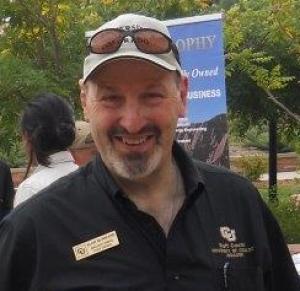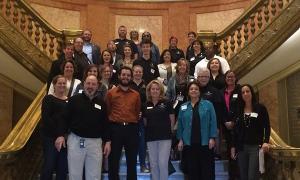Five questions for Alan Slinkard

A member of the Facilities Management team, Alan Slinkard is a projects specialist at CU Boulder. He also serves in leadership on the University of Colorado Staff Council (UCSC), the university-wide representative body for communicating the interests of staff to CU administration and the Board of Regents.
After serving as parliamentarian of the governance group last year, Slinkard this year is co-chair. (His fellow co-chair, JáNet Hurt, will be featured in a future Five Questions feature in CU Connections.)
Away from work, Slinkard makes time for “sitting by still streams and writing poetry, hiking, cycling, reading deep philosophical treatises (especially Stoicism) and facilitating labyrinth walks to destress my staff and other members of the community.”
1. How did you arrive in your position in facilities management at CU Boulder, and what does the job entail?
I began my career as the campus window washer. My goal at the time was to utilize the job to assist me in finishing my degree so that I was not using needed financial resources to pay my way. As the job morphed, I began doing data analytics and worked in developing a temporary staffing program to supplement the hiring of the full-time staff I was also responsible for.
Another aspect of my role is to evaluate construction documents and determine if the standards being used by contractors meet the rigid goals we have for sustainability, quality and safety.
I also won an innovation grant in 2017 to institute a custodial inspection program with an application called OrangeQC.
Even though I have accomplished many things in my tenure here in FacMan, more than anything I have fallen in love with the beauty, the serenity and synergy of our beautiful campus.
2. What prompted you to get involved with the CU Boulder Staff Council and the University of Colorado Staff Council?
I served on Boulder Staff Council from 2013 through 2022 and have served on UCSC since 2018. Being an advocate all my life, Staff Council was a perfect extension of my desire to ensure that staff’s voice was heard and that their needs were being met.
3. How do you define shared governance?
Shared governance refers to the processes and structures that governing boards, faculty, professional staff and administration use to develop policies and make decisions that affect the institution.
Ideally, shared governance is characteristically collegial. All individuals and groups get a chance to contribute and have their voices and opinions heard.
The benefit of shared governance is that it taps the knowledge, wisdom and experience of a variety of groups and people with the aim of sharing resources and identifying meaningful opportunities to help move the institution forward.
4. This year, you are serving as co-chair of UCSC with JáNet Hurt. How will the two of you share responsibilities?
Thus far it has been a work in progress as each of us has had scheduling challenges. However, at this point, we rotate chairing both full council meetings as well as executive sessions, and we rotate UCSC presentations to the Board of Regents. We have weekly leadership meetings to evaluate the work we have on our plate and to ensure that each of the items needing our attention is assigned accordingly.
Working with Ja’Net allows us as co-chairs to have individual as well as collegial goals. For me, staff housing, child care, continued enhancements to the tuition benefit and working to help the administration find the resources to enhance pay and retention issues are the big ones.
This year, the council’s top priorities are DEI, professional development, staff retention and a better understanding of what staff feels are their top three needs: pay, respect and advancement opportunities.
5. Why do you believe Staff Council is important to the university?
I believe there are three core values that make Staff Council a valued partner in the work of the university: advocacy, collaboration and transparency.
Advocacy is about serving staff members by representing their best interests to the university community, fostering a pathway of communication between upper administration and our constituents, and seeking diversity in membership, perspectives and ideas when representing staff culture.
Collaboration means creating a sense of community by forging effective partnerships with campus stakeholders and executing projects that are valuable to the organization.
Transparency comes from maintaining honest and transparent communications and processes, remaining accountable to ourselves and to our constituents by holding open meetings and publicizing our decisions, and intentionally sharing unbiased information with our stakeholders.



